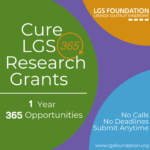2017 Grant Recipient – Aaron Warren
Identifying neuroimaging predictors of treatment outcomes following deep brain stimulation in patients with Lennox-Gastaut Syndrome
Aaron Warren, PhD
University of Melbourne, Australia
Highlights:
- We will study 20 patients who are participating in a recently commenced clinical trial where a stimulation and recording device is surgically implanted into the brain.
- Analyze sleep-wake rhythms in daily recordings of brain activity captured
- Any data collected will be used to determine treatments to reduce seizures and improve quality of life.
Results:
Coming soon
Lay Abstract:
Families rank sleep disturbances among the most harmful and challenging parts of caring for a loved one with LGS. Seizures tend to increase in the nighttime, suggesting they are intricately linked to the changes in brain activity that occur during sleep. If we can alter this activity, for example using brain stimulation treatments, we might be able to reduce seizures whilst promoting better sleep. This would help patients as well as caregivers, who are often awakened multiple times throughout the night to check on and care for patients.
In patients with other types of epilepsy, we recently found that the efficacy of brain stimulation treatment was associated with circadian rhythms (i.e., sleep-wake cycles) in daily recordings of brain activity. Specifically, we found that people who had more intact sleep-wake rhythms responded better to treatment.
In this project, we will see if there is a similar relationship in LGS. We will study 20 patients who are participating in a recently commenced clinical trial where a stimulation and recording device is surgically implanted into the brain. We will analyze sleep-wake rhythms in daily recordings of brain activity captured by the device. We will explore how the recordings change when the device is delivering stimulation and examine whether these changes can predict whether treatment helps to reduce seizures and improve quality of life.
If successful, the findings will have far-reaching benefits for patients and caregivers. They will provide a new target of treatment for existing therapies like brain stimulation and new therapies aimed at improving sleep-wake cycles. Fewer seizures and better sleep will also reduce the risk of secondary health conditions that we know can result from disrupted sleep, including mood disorders, diabetes, and learning difficulties.
 The LGS Foundation accepts unsolicited proposals year-round to seed new basic, translational, and clinical research projects on LGS. Projects may be funded at the $25,000, $50,000, or $75,000 level.
The LGS Foundation accepts unsolicited proposals year-round to seed new basic, translational, and clinical research projects on LGS. Projects may be funded at the $25,000, $50,000, or $75,000 level.
Updated 01/09/25 (KK)

